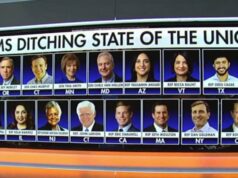Harvard University President Claudine Gay has come under increased scrutiny this past week following her contentious testimony before Congress where she stopped short of labeling calls for the “genocide of Jews” as hate speech.
The controversy surrounding President Gay, along with several other university leaders who echoed her sentiment, including the Presidents of the University of Pennsylvania and the Massachusetts Institute of Technology (MIT), has led to heightened tension within academic circles.
Recent developments have seen the resignation of Liz Magill, President of UPenn, after insurmountable pressure from influential Jewish organizations. Scott Bok, Chairman of the Board at UPenn, is reportedly also stepping down.
In the wake of the October 7 massacre by Hamas-affiliated terrorists in Israel, the response among American academia has largely been pro-Hamas, with a string of student groups championing the Palestinian cause at the cost of overlooking concerns of the Jewish community. This narrative persists despite considerable support for Israel from American Jewish groups politically and financially.
On Monday, The Gateway Pundit reported that allegations have now emerged suggesting President Gay may have committed academic misconduct by plagiarizing her PhD thesis, potentially breaching Harvard’s academic code of ethics. Having made history as Harvard’s first black President in 2023, Gay’s academic credentials, including her bachelor’s degree from Stanford and her master’s and PhD from Harvard, have come under intense scrutiny.
Christopher Rufo of the Manhattan Institute highlighted striking similarities between parts of Gay’s doctoral thesis and uncredited works of other academics, raising questions about the originality of her scholarship.
Notably, Rufo has put forward evidence suggesting appropriation of ideas from conservative scholar Prof. Carol Swain, formerly of Princeton and Vanderbilt Universities, detailed further in his Substack.
First, Gay lifts an entire paragraph nearly verbatim from a paper by Lawrence Bobo and Franklin Gilliam’s, while passing it off as her own paraphrase and language.
This is a direct violation of Harvard’s policy: “When you paraphrase, your task is to distill the source’s ideas… pic.twitter.com/t6enHp3dN9
— Christopher F. Rufo ⚔️ (@realchrisrufo) December 10, 2023
Gay has defended her academic record, maintaining the integrity of her work amidst these claims.
“I stand by the integrity of my scholarship. Throughout my career, I have worked to ensure my scholarship adheres to the highest academic standards,” said Gay in a statement to the Boston Globe.
Dr. Carol Swain, the victim of Gay’s plagiarism, expressed dismay at the situation, intimating a sense of profound professional violation. In a compelling discussion with Rufo, Swain shared her grievances and the implications she believes this holds for both her and Gay’s careers.

Transcript of the interview via City Journal:
Christopher Rufo: What are your thoughts about the Claudine Gay plagiarism accusations?
Carol Swain: What is bothering me is not just that there’s passages she didn’t put in quotation marks. When I look at her work, I feel like her whole research agenda, her whole career, was based on my work. It bothers me because I know that my work was a big deal in the early 1990s. And I started falling out of favor in 1995 when I started criticizing race-based affirmative action. I thought affirmative action should be means-tested and race-neutral. When I started putting those ideas out, that’s when I started falling out of favor and getting labeled as a conservative, even while I was a Democrat, and blacks started attacking me, calling me a “sellout.”
Rufo: In my recent story, I documented at least two instances in which Gay lifted from your work. Do you consider that to be plagiarism?
Swain: There seems to be a pattern because it’s not just two cases from my work. There are instances that you point to from other people’s work. At best, it was sloppiness, but it would be considered plagiarism if you lift sections of other people’s work and you pass it off as your own.
Rufo: Throughout the paper, she lifted verbatim passages from others but did not put them in quotation marks. I consulted Harvard’s own plagiarism policy, and these all appear to be clear violations.
Swain: She became president of Harvard and got recognition as being its first black president. I don’t believe her record warranted tenure, and I believe that I had to meet a much higher standard than she did. Something changed in the mid-1990s, [when] we were having a big affirmative action debate.
Rufo: Tell me more about this.
Swain: It’s clear to me that standards were lowered in the mid-1990s, and the elites came together and decided that they were going to defend affirmative action. It’s clear to me that she was a beneficiary of that. I blame her committee, and I blame white progressives equally. She should have known what constitutes plagiarism. And I would say in particular about the articles that she published that went through reviewers and the people on her committee, I would’ve thought they would have noticed she was doing research that was building on my work, that they would have acknowledged that she was building on my ideas. I also have no doubt that progressives have always elevated people who fit the bill of what they’re looking, and they needed someone like her.
Rufo: What do you mean by that?
Swain: White progressives have always rewarded the blacks who supported their ideas. Someone more mainstream, like me, could never be rewarded in the same way.
Rufo: In this specific case, given the lower standards, the allegations of plagiarism, and the other scandals that are swirling around Gay, should she resign from the presidency of Harvard?
Swain: The board of trustees needs to deal with those issues. They need to apply the same standards to her as they would apply to a white person under the same circumstances.
Rufo: And under these circumstances, what do you think would happen to a white person?
Swain: A white male would probably already be gone.











